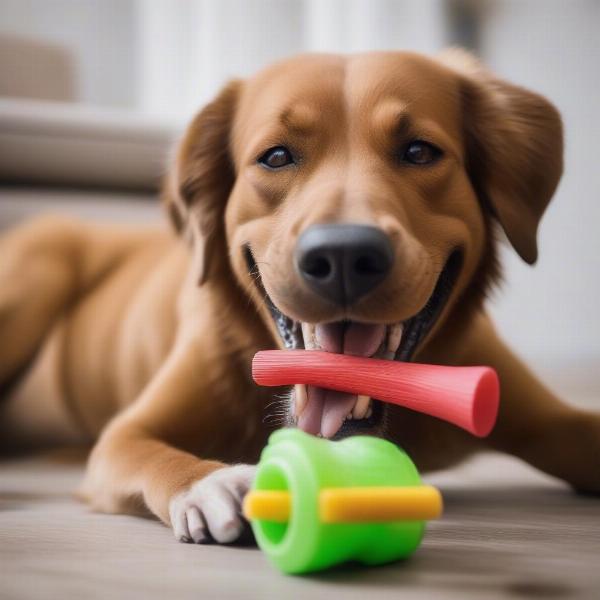Choosing a long lasting dog chew can feel overwhelming with so many options available. This guide will cover everything you need to know about selecting the perfect chew for your furry friend, from understanding their chewing habits to identifying safe and durable options. Whether you have a powerful chewer or a gentle nibbler, we’ll help you find the ideal long lasting dog chew to keep them entertained and satisfied.
Understanding Your Dog’s Chewing Needs
Before diving into the world of long lasting dog chews, it’s essential to understand why dogs chew in the first place. Chewing is a natural instinct for dogs, serving various purposes:
- Teething Puppies: Chewing helps relieve the discomfort of teething puppies.
- Boredom and Anxiety: Chewing can be a coping mechanism for boredom or anxiety.
- Dental Health: Chewing helps clean teeth and massage gums.
- Mental Stimulation: A good chew provides mental stimulation and prevents destructive behavior.
Consider your dog’s age, size, breed, and chewing habits when choosing a chew. A small, aggressive chewer will require a different type of chew than a large, gentle chewer.
Types of Long Lasting Dog Chews
The market offers a wide variety of long lasting dog chews, each with its pros and cons. Here’s a breakdown of some popular options:
Natural Chews
- Bully Sticks: These are a single-ingredient chew made from dried bull pizzle. They’re highly digestible and long-lasting, especially for moderate chewers.
- Antlers: Antlers are naturally shed from deer and elk, offering a durable and long-lasting chew option for aggressive chewers. They are rich in minerals.
- Rawhide: While popular, rawhide can pose choking hazards and digestive issues for some dogs. Opt for high-quality, tightly-rolled rawhide and supervise your dog while they chew.
Synthetic Chews
- Nylon Bones: These come in various shapes and sizes, offering a durable and long-lasting chew option. Look for nylon bones made in the USA or other reputable sources to ensure safety.
- Rubber Toys: Rubber toys can be filled with treats or used on their own for chewing and fetching. They are a good option for moderate chewers.
Choosing the Right Chew for Your Dog
What if my dog is a powerful chewer? Opt for durable chews like antlers or thick nylon bones.
What if my dog is a senior? Choose softer chews like rubber toys or digestible bully sticks.
What if my dog is allergic to certain ingredients? Carefully examine the ingredient list and opt for single-ingredient chews or those made with hypoallergenic materials.
 Safe and Durable Dog Chews
Safe and Durable Dog Chews
Tips for Safe Chewing
- Supervise Your Dog: Always supervise your dog while they are chewing on any type of chew.
- Choose the Right Size: Ensure the chew is appropriately sized for your dog to prevent choking hazards.
- Discard Damaged Chews: Replace any chews that become small enough to be swallowed whole.
- Introduce New Chews Gradually: Allow your dog to adjust to a new chew before leaving them unsupervised with it.
Conclusion
Finding the perfect long lasting dog chew requires understanding your dog’s individual needs and preferences. By considering their age, size, chewing habits, and any allergies, you can choose a safe and enjoyable chew that will keep them entertained and satisfied. Remember to always supervise your dog while chewing and replace damaged chews to ensure their safety.
FAQ
- How often should I give my dog a long-lasting chew? This depends on your dog’s individual needs and chewing habits. Some dogs may enjoy a chew daily, while others may only need one a few times a week.
- What should I do if my dog swallows a piece of their chew? Contact your veterinarian immediately.
- Are all long-lasting chews safe for my dog? No, not all chews are created equal. Always choose high-quality chews from reputable brands.
- Can puppies have long-lasting chews? Yes, but make sure the chew is appropriate for their age and size.
- What are some signs that my dog’s chew is too small? If your dog can fit the entire chew in their mouth or if it breaks off into small pieces easily, it’s too small.
- Can I give my dog a cooked bone as a chew? No, cooked bones can splinter and cause serious internal injuries. Stick to raw bones (under supervision) or specifically designed dog chews.
- What if my dog doesn’t seem interested in any chews? Try different types of chews to find one that appeals to your dog. You can also try stuffing hollow chews with treats to make them more enticing.
ILM Dog is a leading international website dedicated to providing expert advice and resources on dog care and wellbeing. We offer a wealth of information on dog breeds, health, training, nutrition, grooming, and much more. Whether you’re a new dog owner or a seasoned pro, ILM Dog is your go-to resource for all things canine. Contact us today for personalized advice and support! Email: [email protected], Phone: +44 20-3965-8624. Visit us at ILM Dog.